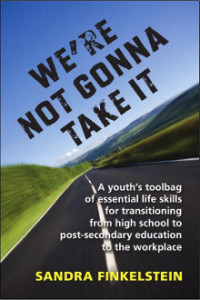
10 Ways to Engage in Children’s Career Development
January 9, 2014
What’s Trending in Career Development?
January 9, 2014By Lynn Sadlowski
 A youth’s toolbag of essential life skills for transitioning from high school to post-secondary education to the workplace
A youth’s toolbag of essential life skills for transitioning from high school to post-secondary education to the workplace
Book by Sandra Finkelstein
We’re not gonna take it is described as a youth’s toolbag of essential life skills for transitioning from high school to post-secondary education to the workplace. It’s intended audience is youth between the ages of 15 and 25 who are moving through very important life transitions toward the world of work at a time when youth unemployment and youth underemployment rates are considered quite high. It is the author’s belief that young people need to stand up against the “old style of thinking” that casts such a bleak future for them. The argument is that in choosing to learn and effectively use the 10 essential life skills outlined in the book, young people will enact changes in the economy and the world, thereby making it a better place for their generation moving forward.
While the seven-part book is designed so that the reader can skip around – reading only relevant sections as needed – the 10 essential life skills outlined in Part 1 are likely a necessary first read. It is difficult to narrow down a long list of life skills into just 10 considered to be essential. The author chose some common ones: decision-making, effective communication, leadership, teamwork and collaboration, goal-setting and building relationships; a few less common ones such as giving, receiving and requesting feedback, the art of storytelling, being in the moment and one at the top of my list – financial awareness and literacy. Rightfully so, a sizeable section is devoted to this area. Financial literacy is a difficult subject for young people. They live in the here and now and when they start to receive that first paycheque or a sizeable student loan, it is far too tempting to buy all the items they have longed for; to frequent the clubs or take a trip for spring break. So I applaud the author’s effort to include financial awareness and literacy and her approach to the subject is accessible to a young reader with relevant examples. Important to this section as well as all others is the offer of tools, exercises, action steps and suggested resources to help the young person practice and integrate the lessons into their lives.
Part 2 and 3 are fairly short sections focusing on decision making regarding high school to post-secondary. Unfortunately the author makes an assumption that all readers would be choosing post-secondary education – “Do I attend college or university?” In my opinion, there is not enough attention paid to the need for self-awareness and finding ‘what’s right for you.’ These exercises and thought processes are a necessary first step in not only selecting a program of study, but in taking that first step into the world of work.
For this reader, “Understanding the Baby boomer-created workplace” might be one of the more important sections of the book. The world of work has changed. On one hand, the dreams and expectations of young people, fuelled by the advice and experience of their parents, are often unrealistic. On the other hand, this generation – often called the Millennials – recognize they have very different core beliefs, values, wants and needs than those of the baby boomers and the comparison used in this book is an effective method of showing how the Millennials are moving toward creating their “new workplace.”
The final section addresses the job search process. Entire libraries could be filled with job search and resume-writing books. We’re not gonna take it highlights a few key points in the process – the need for networking, research and preparation, and provides further resources that the reader can use when relevant to do so.
Overall, the content is accessible to the audience with a variety of tools, exercises and additional resources for further exploration. The book, the first in a series of three, is a good resource for young people and teachers hitting many relevant topics in the area of career development, post-secondary choice and job search.
The author of this review, Lynn Sadlowski, holds a Master’s degree in Education from Queen’s University as well as junior, intermediate and secondary teaching qualifications in Ontario. She has specialist qualifications in guidance and more than 15 years’ experience in career and guidance education. In 2013, Lynn transitioned from a sales consultant role with Career Cruising to a position as career counsellor at Queen’s University. She now works full time in undergraduate admissions at Queen’s.
The authors of the book, Sandra Finkelstein, is a youth advocate who is concerned about the world being handed down to her children and all children. After researching the market for nearly three years, she has provided a timely resource of essential life skills to assist the millennial youths, their parents and youth workers with tools fundamental to youths’ success and to help in the decision-making process.


